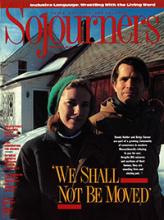MANY INDIVIDUALS AND CONGREGATIONS have struggled with the problem of exclusive language in scripture, especially the biblical passages used each week in worship. Some have felt hurt and excluded by words that are meant to heal and unite, and find the worship experience itself marred by the very texts that call them to be God's people.
Some people have attempted to deal with exclusive language in scripture by simply amending biblical passages to remove the troublesome expressions. Others don't accept this approach; they feel that it is inappropriate to change scriptural texts regardless of how offensive they may be. These people have preferred to suffer through readings that contain language that in any other context would be considered anachronistic.
Parishioners at St. Stephen and the Incarnation Episcopal Church in Washington, D.C. have attempted to plow a middle ground. Holding that scripture is sacred and inspired by God, and yet convinced that there was a way around the problem of exclusive language in the weekly lectionary readings, the people of St. Stephen's began what became a four-year project that evolved into an inclusive-language lectionary called Hearing the Word.
The authors of the St. Stephen's lectionary are not scholars or theologians, and their work was not an attempt to produce a new standard biblical translation. While they used standard committee translations in their work, and in most cases attempted to render accurately the meaning if not the specific phrasing of the original manuscript, at times their process departed considerably from the standard practices of biblical translation.
Read the Full Article

